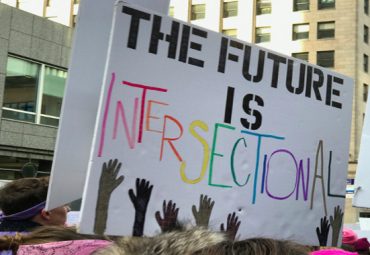
Even a casual follower of campus happenings has probably heard of the term “intersectionality” by now.
Coined by critical race theorist Kimberlé Crenshaw of UCLA and Columbia Law Schools, intersectionality originally was “a way to help explain the oppression of African-American women.” In Crenshaw’s own words, intersectionality is
[…] a lens through which you can see where power comes and collides, where it interlocks and intersects. It’s not simply that there’s a race problem here, a gender problem here, and a class or LBGTQ problem there. Many times that framework erases what happens to people who are subject to all of these things.
Now the “Intersectionality Score Calculator” (hilariously) allows you to “compare your level of oppression with others.” Not to mention, “you can use it when you’re dealing with others to know who’s more marginalized instead of getting to know them as individuals”!!
From the site:
Why sliders?
We believe that people fit along a spectrum of identities. For example, you might be slightly bisexual, somewhat poor, Jewish but rarely wear a yarmulke, and native born but travel frequently abroad. By having the option to be ‘somewhere in the middle’, this gives a more accurate assessment of your intersectionality score.How can I improve my score?
Unfortunately, you are born with most of your intersectional factors. However, you can make some improvement to your score by getting more involved with Islam or Judaism, donate all excess wealth to charity, or explore the wild side of your sexuality. The easiest way to improve your score, however, is to champion the intersectionality of your more-marginalized friends. You may award yourself up to 5 points depending on the level of your activism.Why include religion?
Some have commented that the religious sliders are anti-Semitic, Islamophobic, atheistophobic or possibly even Christianophobic. They are included to show that a complete intersectionality score embraces the diversity of religious thought if they are of a minority groups.Can I be accused of being oppressive even if I have a high score?
Yes, having a high intersectionality score doesn’t completely immunize you from being called an oppressor. You may be vulnerable to “weakest link” attacks – that is, being called an oppressor on any of the intersectionality factors by those disadvantaged in that factor. For example, a gay black man could still be accused of being a misogynist by women or a poor, immigrant woman could be called transphobic by a transperson.
Thankfully, even some “studies” professors have begun to question the “flippancy” and “buzzword”-like nature Crenshaw’s term.
MORE: Student essay on ‘intersectionality’ ups the gibberish quotient
MORE: Penn celebrates Anita Hill, intersectionality founder
IMAGE: Keith Rowley / Flickr.com
Like The College Fix on Facebook / Follow us on Twitter





Please join the conversation about our stories on Facebook, Twitter, Instagram, Reddit, MeWe, Rumble, Gab, Minds and Gettr.